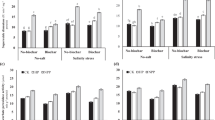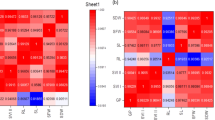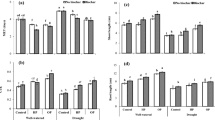Abstract
Salt stress impedes the productivity of wheat (Triticum aestivum L.) in many parts of the world. This study evaluated the potential role of benzyl aminopurine (BAP) and sorghum water extract (SWE) in improving the wheat performance under saline conditions. Seeds were primed with BAP (5 mg L−1), SWE (5% v/v), BAP + SWE, and distilled water (hydropriming). Soil filled pots maintained at the soil salinity levels of 4 and 10 dS m−1 were used for the sowing of primed and non-primed seeds. Salt stress suppressed the wheat growth; seed priming treatments significantly improved the wheat growth under optimal and suboptimal conditions. Total phenolics, total soluble sugars and proteins, α-amylase activity, chlorophyll contents, and tissue potassium ion (K+) contents were increased by seed priming under salt stress; while, tissue sodium ion (Na+) contents were decreased. Seed priming with SWE + BAP was the most effective in this regard. Under salt stress, the tissue Na+ contents were reduced by 5.78, 28.3, 32.2, 36.7% by hydropriming, seed priming with SWE, seed priming with BAP, and seed priming with SWE + BAP, respectively over the non-primed control. Effectiveness of seed priming techniques followed the order SWE + BAP > BAP > SWE > Hydropriming. In conclusion, seed priming with SWE + BAP may be opted to improve the tolerance against salt stress in wheat.



Similar content being viewed by others
References
Alom R, Hasan MA, Islam MR, Wang QF (2016) Germination characters and early seedling growth of wheat (Triticum aestivum L.) genotypes under salt stress conditions. J Crop Sci Biotechnol 19:383–392
Arnon DI (1949) Copper enzymes in isolated chloroplast polyphenoloxidases in Beta vulgaris. Plant Physiol 24:1–15
Aslam F, Khaliq A, Matloob A, Tanveer A, Hussain S, Zahir ZA (2017) Allelopathy in agro-ecosystems: a critical review of wheat allelopathy-concepts and implications. Chemoecology 27:1–24
Association of Official Seed Analysts (AOSA) (1983) Seed vigor testing handbook. Contribution No. 32 to the handbook on seed testing. Association of Official Seed Analysts, Springfield, III
Association of Official Seed Analysts (AOSA) (1990) Rules for testing seeds. J Seed Technol 12:1–112
Bajwa AA, Farooq M (2017) Seed priming with sorghum water extract and benzyl amino purine along with surfactant improves germination metabolism and early seedling growth of wheat. Arch Agron Soil Sci 63:319–329
Barber SA (1984) Soil nutrient bioavailability: a mechanistic approach. Wiley, New York
Basra SMA, Afzal I, Rashid RA, Hameed A (2005) Inducing salt tolerance in wheat by seed vigor enhancement techniques. Int J Biotechnol Biol 2:173–179
Ben-Hammouda M, Kremer RJ, Minor HC, Sarwar M (1995) A chemical basis for differential allelopathic potential of sorghum hybrids on wheat. J Chem Ecol 21:775–786
Bernfeld P (1955) Amylases α and β. In: Cdowick SP, Kaplan I (eds) Methods in enzymology, vol 1. Academic Press, New York, pp 149–158
Bradford MM (1976) A rapid and sensitive method for the quantification of microgram quantities of protein utilizing the principle of protein-dye binding. Anal Biochem 72:248–254
Cheema ZA, Khaliq A (2000) Use of sorghum allelopathic properties to control weeds in irrigated wheat in semi-arid region of Punjab. Agric Ecosyst Environ 79:105–112
Cheema ZA, Mushtaq MN, Farooq M, Hussain A, Din IU (2009) Purple nutsedge management with allelopathic sorghum. Allelopathy J 23:305–312
Chen JG, Zhao HY, Zhou X, Mao LS, Chen XX (1997) Fluctuation in levels of endogenous hormones after decapitation and 6-benzyl amino purine treatment in azalea, and their relationship to apical dominance. Sci Hortic 71:49–58
Coolbear P, Francis A, Grieson G (1984) The effect of low temperature pre sowing treatment under the germination performance and membrane integrity of artificially aged tomato seeds. J Exp Bot 35:1609–1617
Cvikrova M, Hrubcova M, Eder J, Binarova P (1996) Changes in the levels of endogenous phenolics, aromatic monoamines, phenylalanine ammonia-lyase, peroxidase, and auxin oxidase activities during initiation of alfalfa embryogenic and non embryogenic calli. Plant Physiol Biochem 34:853–861
DuBois M, Giles KA, Hamilton JK, Roberes P, Smith F (1956) Colorometric method for determination of sugars and related substances. Anal Chem 28:350–356
Ellis RA, Roberts EH (1981) The quantification of ageing and survival in orthodox seeds. Seed Sci Technol 9:373–409
Farooq M, Basra SMA, Hafeez K, Ahmad N (2005) Thermal hardening: a new seed vigor enhancement tool in rice. J Integer Plant Biol 47:187–193
Farooq M, Basra SMA, Wahid A, Ahmad N, Saleem BA (2009a) Improving the drought tolerance in rice (Oryza sativa L.) by exogenous application of salicylic acid. J Agron Crop Sci 195:237–246
Farooq M, Wahid A, Kobayashi N, Fujita D, Basra SMA (2009b) Plant drought stress: effects, mechanisms and management. Agron Sustain Dev 29:185–212
Farooq M, Habib M, Rehman A, Wahid A, Munir R (2011a) Employing aqueous allelopathic extracts of sunflower in improving salinity tolerance in rice. J Agric Soc Sci 7:75–80
Farooq M, Jabran K, Cheema ZA, Wahid A, Siddique KHM (2011b) The role of allelopathy in agricultural pest management. Pest Manag Sci 67:493–506
Farooq M, Hussain M, Wakeel A, Siddique KHM (2015) Salt stress in maize: effects, resistance mechanisms, and management. A review. Agron Sustain Dev 35:461–481
Farooq M, Hussain M, Nawaz A, Lee DJ, Alghamdi SS, Siddique KH (2017a) Seed priming improves chilling tolerance in chickpea by modulating germination metabolism, trehalose accumulation and carbon assimilation. Plant Physiol Biochem 111:274–283
Farooq M, Rizwan M, Nawaz A, Rehman A, Ahmad R (2017b) Application of natural plant extracts improves the tolerance against combined terminal heat and drought stresses in bread wheat. J Agron Crop Sci 203:528–538
Hu Y, Schmidhalter U (1997) Interactive effects of salinity and macronutrient level on wheat. J Plant Nutr 20:1169–1182
Iqbal M, Ashraf M, Jamil A (2006) Seed enhancement with cytokinins: changes in growth and grain yield in salt stressed wheat plants. Plant Growth Regul 50:29–39
Jafar MZ, Farooq M, Cheema MA, Afzal I, Basra SMA, Wahid A, Aziz T, Shahid M (2012) Improving the performance of wheat by seed priming under saline conditions. J Agron Crop Sci 198:38–45
Julkenen-Titto R (1985) Phenolic constituents in the leaves of northern willows: methods for the analysis of certain phenolics. Agri Food Chem 33:213–217
Koyro HW, Ahmad P, Geissler N (2012) Abiotic stress responses in plants: an overview. In: Ahmad P, Prasad MNV (eds) Environmental adaptations and stress tolerance of plants in the era of climate change. Springer, New York, pp 1–28
Lee SS, Kim JH (2000) Total sugars, α-amylase activity and emergence after priming of normal and aged rice seeds. Kor J Crop Sci 45:108–111
Lehle FR, Putnam AR (1983) Allelopathic potential of sorghum (Sorghum bicolor L.): isolation of seed germination inhibitors. J Chem Ecol 9:1223–1224
Maqbool N, Wahid A, Farooq M, Cheema ZA, Siddique KHM (2013) Allelopathy and abiotic stress interaction in crop plants. In: Cheema ZA, Farooq M, Wahid A (eds) Allelopathy: current trends and future applications. Springer, Berlin Heidelberg, pp 451–468
Mumtaz S, Naqvi SS, Shereen A, Khan MA (1997) Salinity stress and the senescence process in wheat (Triticum aestivum L.). Pak J Bot 29:299–303
Nickeil LG (1982) Plant growth regulators. Agricultural uses. Springer, Berlin Heidelberg New York
Nouman W, Basra SMA, Siddiqui MT, Khan RA, Mehmood S (2012) Seed priming improves the growth and nutritional quality of rangeland grasses. Int J Agric Biol 14:751–756
Nouman W, Basra SMA, Yasmeen A, Gull T, Hussain SB, Zubair M, Gul R (2014) Seed priming improves the emergence potential, growth and antioxidant system of Moringa oleifera under saline conditions. Plant Growth Regul 73:267–278
Parida A, Das AB, Sanada Y, Mohanty P (2004) Effects of salinity on biochemical components of the mangrove Aegiceras corniculatum. Aquatic Bot 80:77–87
Popa VI, Dumitru M, Volf I, Anghel N (2008) Lignin and polyphenols as allelochemicals. Ind Crop Prod 27:144–149
Razmjoo K, Heydarizadeh P, Sabzalian MR (2008) Effect of salinity and drought stresses on growth parameters and essential oil content of Matricaria chamomile. Int J Agri Biol 10:451–454
Rice EL (1984) Allelopathy. Academic Press, New York
Rice-Evans C, Miller NJ, Paganga G (1997) Antioxidant properties of phenolic compounds. Trends Plant Sci 2:152–159
Rios-Gonzalez K, Erdei L, Lips SH (2002) The activity of antioxidant enzymes in maize and sunflower seedlings as affected by salinity and different nitrogen sources. Plant Sci 162:923–930
Rosa M, Prado C, Podazza G, Interdonato R, González JA, Hilal M, Prado FE (2009) Soluble sugars—metabolism, sensing and abiotic stress: a complex network in the life of plants. Plant Signal Behav 4:388–393
Séne MN, Gallet C, Dore T (2001) Phenolic compounds in a Sahelian sorghum (Sorghum bicolor L.) genotype (CE145-66) and associated soils. J Chem Ecol 27:81–92
Shaddad MAK, Abd El-Samad HM, Mostafa D (2013) Role of gibberellic acid (GA3) in improving salt stress tolerance of two wheat cultivars. Int J Plant Physiol Biochem 5:50–57
Shoresh M, Spivak M, Bernstein N (2011) Involvement of calcium mediated effects on ROS metabolism in the regulation of growth improvement under salinity. Free Rad Biol Med 51:1221–1234
Singh B, Usha K (2003) Salicylic acid induced physiological and biochemical changes in wheat seedlings under water stress. Plant Growth Regul 39:137–141
Steel RGD, Torrie JH, Dickey DA (1997) Principles and procedures of statistics: a biometric approach, 3rd edn. McGraw Hill Book Co., Inc., New York
Sundaravalli V, Paliwal K, Ruckmani A (2005) Effect of water stress on photosynthesis, protein content and nitrate reductase activity of Albizzia seedlings. J Plant Biol 32:13–17
Szalai G, Janda T (2009) Effect of salt stress on the salicylic acid synthesis in young maize (Zea mays L.) plants. J Agron Crop Sci 195:165–171
Tabatabaei SA (2013) The effect of salicylic acid and gibberellin on enzyme activity and germination characteristics of wheat seeds under salinity stress conditions. Int J Agric Crop Sci 6:236–240
Taiz L, Zeiger E, Møller IM, Murphy A (2015) Plant physiology and development, 6th edn. Sinauer Associates Inc. Publishers, Massachusetts
Tounsi S, Feki K, Hmidi D, Masmoudi K, Brini F (2017) Salt stress reveals differential physiological, biochemical and molecular responses in T. monococcum and T. durum wheat genotypes. Physiol Mol Biol Plants 23:517–528
USDA Laboratory Manual (1954) Diagnosis and improvement of saline and alkali soils. In: Richards LA (ed) Superintendent of Documents. US Government Printing Office, Washington DC
Williams V, Twine S (1960) Flame photometric method for sodium, potassium and calcium. In: Peach K, Tracey MV (eds) Modern methods of plant analysis. Springer, Berlin, pp 3–5
Yadu S, Dewangan TL, Chandrakar V, Keshavkant S (2017) Imperative roles of salicylic acid and nitric oxide in improving salinity tolerance in Pisum sativum L. Physiol Mol Biol Plants 23:43–58
Yasmeen A, Basra SMA, Farooq M, Rehman H, Hussain N (2013) Exogenous application of moringa leaf extract modulates the antioxidant enzyme system to improve wheat performance under saline conditions. Plant Growth Regul 69:225–233
Zhang F, Yu J, Johnston CR, Wang Y, Zhu K, Lu F, Zhang Z, Zou J (2015) Seed priming with polyethylene glycol induces physiological changes in sorghum (Sorghum bicolor L. Moench) seedlings under suboptimal soil moisture environments. PLoS ONE 10:e0140620
Zhu JK (2001) Plant salt tolerance. Trends Plant Sci 6:66–71
Author information
Authors and Affiliations
Corresponding author
Rights and permissions
About this article
Cite this article
Bajwa, A.A., Farooq, M. & Nawaz, A. Seed priming with sorghum extracts and benzyl aminopurine improves the tolerance against salt stress in wheat (Triticum aestivum L.). Physiol Mol Biol Plants 24, 239–249 (2018). https://doi.org/10.1007/s12298-018-0512-9
Received:
Revised:
Accepted:
Published:
Issue Date:
DOI: https://doi.org/10.1007/s12298-018-0512-9




